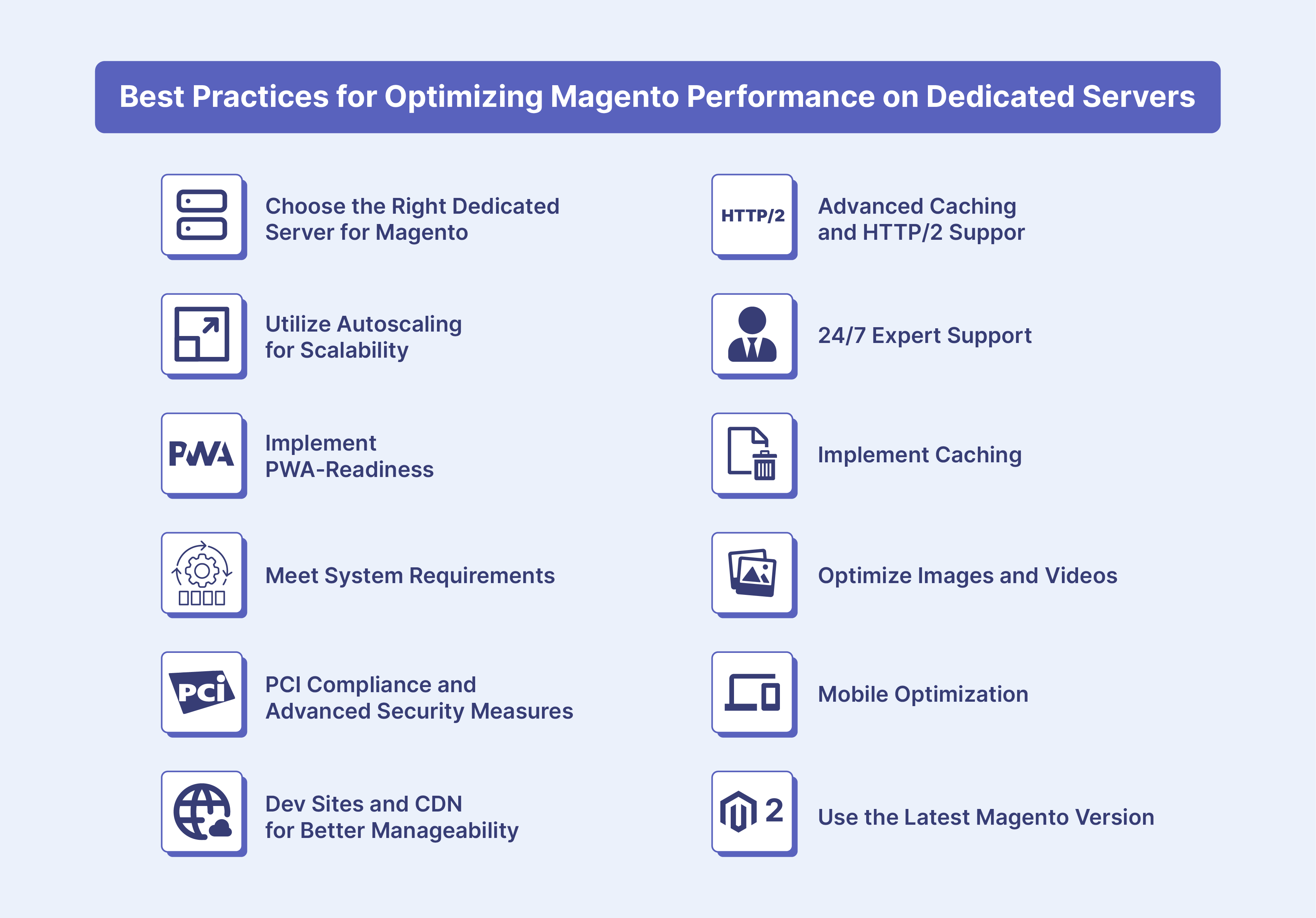
Magento Hosting on Dedicated Servers: 12 Best Practices and Benefits
Hosting Magento on dedicated servers gives Magento store owners complete control over their server environment. This control allows for the implementation of essential software updates and Magento security patches without the need for hosting provider approvals. This blog will explore the best practices for optimizing Magento on dedicated servers. By following these guidelines, you can ensure that your Magento store operates efficiently. It will also offer your customers a secure and smooth shopping experience.
Key Takeaways
-
Discover how to optimize Magento performance on dedicated servers.
-
Exploring server selection criteria, emphasizing CPU, RAM, and storage for optimal functionality.
-
Learn scalable strategies such as AWS autoscaling to manage varying traffic levels efficiently.
-
Implement PWA readiness for faster mobile loading and enhanced search rankings.
-
Ensure system requirements compliance for seamless operation and security.
-
Leverage advanced caching, HTTP/2 support, and image/video optimization for faster page loading and responsiveness.
What is Magento Hosting?

Magento hosting is a specialized web hosting designed exclusively for the Magento ecommerce platform. This tailored hosting solution is specifically crafted to meet the unique demands of Magento-based online stores.
It plays a pivotal role in ensuring Magento stores can operate effectively, providing essential performance and security features to support the seamless execution of online retail transactions.
Magento is an extensive software package. It demands a hosting environment that is finely tuned to its specifications. When it comes to hosting Magento, there are four main types to consider:
-
Shared Hosting: Shared hosting involves multiple websites sharing resources on a single server. While it can be cost-effective, it may not provide the performance and customization required for larger or more demanding Magento stores.
-
VPS Hosting (Virtual Private Server): VPS hosting offers a dedicated portion of a virtual server with more resources than shared hosting. It balances cost-efficiency and performance, making it suitable for mid-sized Magento stores.
-
Dedicated Hosting: Dedicated hosting allocates an entire physical server exclusively to a single Magento store. This type of hosting offers unparalleled performance, customization, and security, making it ideal for large-scale and high-traffic ecommerce sites.
-
Cloud Hosting: Magento Cloud hosting utilizes a network of interconnected virtual servers to host a Magento store. It offers scalability, flexibility, and redundancy, allowing stores to adapt to changing traffic patterns and ensuring high availability.
Importance of Dedicated Servers for Magento Hosting
1. PCI Compliance and Security Enhancement

PCI compliance is crucial for stores that accept credit card payments. Dedicated hosting ensures compliance with regulations to protect credit card information. Security measures include SSL certificates, firewalls, and regular updates. These measures enhance data security and build customer trust.
2. Customized Configuration

Dedicated hosting allows tailored server settings, ensuring fast page loading and smooth transactions. It provides flexibility for optimizing your Magento store's performance. You can choose your Magento store's hardware and operating system, provided it aligns with Magento requirements.
3. Improved Website Performance and Speed

Magento-dedicated hosting significantly boosts Magento website speed, resulting in quicker page loading. Faster page loading enhances the user experience and attracts more visitors to your store.
4. Higher Scalability

Dedicated hosting facilitates easy resource upgrades and additional servers to manage traffic spikes. It ensures a seamless user experience during peak periods and accommodates growing demands.
Best Practices for Optimizing Magento Performance on Dedicated Servers

1. Choose the Right Dedicated Server for Magento
Selecting the appropriate dedicated server is fundamental to optimizing Magento performance. Ensure that the server specifications align with the demands of Magento. Consider factors such as:
-
Processor: Opt for a robust CPU, like the Intel Xeon processor, for optimal performance.
-
Memory (RAM): A minimum of 2GB RAM is recommended to handle multiple visitors effectively.
-
Storage: Prioritize solid-state drives (SSDs) over traditional hard disk drives (HDDs) for faster data retrieval.
-
Scalability: Choose a server that allows easy resource upgrades to accommodate your store's growth.
-
Network Speed: Verify that the server provider offers high network speeds to ensure fast site loading.
2. Utilize Autoscaling for Scalability
In Magento dedicated hosting, it is extremely challenging to scale a website automatically since your hardware resources limit you. Once your servers are maxed out, your site will inevitably slow down and possibly even crash (depending on the significance of the traffic spike). It causes you to lose precious customers and potential revenue.
Autoscaling is a valuable feature for handling varying traffic levels on your Magento store. It dynamically adjusts the number of servers in response to visitor volume. It ensures:
-
Effortless management during high-traffic periods like sales or holidays.
-
Optimal server resource allocation, preventing slowdowns during traffic spikes.
-
Autoscaling adapts to your Magento store demands, keeping your store running smoothly.
3. Implement PWA-Readiness
Making your Magento store Progressive Web App (PWA)-ready enhances performance and user experience. Key benefits include:
-
Fast page loading on mobile devices, even with slow or unreliable internet connections.
-
Improved search engine rankings due to a faster and more reliable site.
-
Enhanced Magento Varnish caching when PWA is integrated, reducing server load and speeding up page rendering.
Install Magento 2 PWA extensions to increase customer satisfaction and sales by providing a faster and more efficient online shopping experience.
4. Meet System Requirements
Ensure your dedicated server meets Magento's system requirements for optimal performance and compatibility:
-
Operating System: Use Linux-based distributions.
-
Memory: Have a minimum of 2GB RAM available.
-
Web Server: Choose between Apache 2.4 or Nginx 1.x.
-
Database: MySQL 5.7 or 8.0, MariaDB 10.4, or Percona.
-
PHP: Use PHP 7.4, 8.0, or the latest supported versions.
-
Elasticsearch: Employ Elasticsearch 7.x for catalog search.
-
SSL Certificate: Highly recommended for enhanced security.
5. PCI Compliance and Advanced Security Measures
Maintain PCI compliance by implementing advanced security measures such as:
-
SSL certificates for secure data transmission.
-
Web Application Firewalls for Magento to deter unauthorized access.
-
Regular updates to address security vulnerabilities.
-
Ongoing Magento security audits to protect your store against potential threats.
6. Dev Sites and CDN for Better Manageability
Dev sites and a Content Delivery Network (CDN) contribute to improved store manageability and performance:
-
Dev sites allow safe testing of plugins, themes, and code changes without impacting the live site.
-
A CDN accelerates page loading by caching copies of your site on servers worldwide. When visitors access your site, the CDN selects the nearest server, reducing page load times.
-
CDNs efficiently handle increased visitor traffic, ensuring smooth store operation.
-
Caching within the CDN speeds up access to frequently accessed site components.
7. Advanced Caching and HTTP/2 Support
Advanced caching is a valuable technique that significantly boosts the speed of your Magento store. It involves storing frequently accessed elements of your website, such as images, scripts, and content, in a cache. When a user visits your site, these cached elements are quickly delivered to their browser, reducing the time it takes for pages to load.
Leveraging HTTP/2 support further enhances the speed and performance of your Magento store. HTTP/2 is the latest version of the Hypertext Transfer Protocol, which governs how data is transferred between a web server and a web browser.
8. 24/7 Expert Support
Access to 24/7 expert support is invaluable for addressing any issues with your Magento store. It ensures timely assistance from knowledgeable professionals who can help you resolve technical challenges, answer queries, and provide guidance. This continuous support minimizes Magento downtime, safeguards customer experiences, and maintains the smooth operation of your online store.
9. Implement Caching
Implementing caching is a crucial strategy for effectively managing high-traffic websites. Caching involves saving copies of your website's pages and serving them to users instead of generating them for each request.
This process substantially reduces page load times, improving website speed and responsiveness. Magento offers built-in caching capabilities. You can further optimize your website's performance by utilizing third-party caching extensions.
10. Optimize Images and Videos
While high-quality visuals are essential for showcasing products, they can slow down website performance if not optimized correctly. Compressing and optimizing images and videos is essential to mitigate this issue and reduce load times.
11. Mobile Optimization
A significant portion of customers access ecommerce stores through mobile devices. A responsive Magento design that seamlessly adapts to various screen sizes and ensures quick loading on mobile devices can greatly enhance the overall user experience.
Also, implementing mobile-specific features like user-friendly menus and buttons further ensures an enhanced mobile ecommerce website on Magento.
12. Use the Latest Magento Version
Utilizing the latest version of the Magento platform is critical when managing high-traffic websites. The latest Magento versions offer features and integrations that enable you to customize your website to meet the demands of large volumes of traffic, orders, and customers.
Staying updated with the most recent Magento release allows you to seamlessly integrate with various third-party tools and services, including payment gateways, shipping options, and marketing tools.
FAQs
1. What are the key benefits of Magento hosting providers on dedicated servers?
Hosting your Magento site on dedicated servers offers tailored server settings, optimizing performance across multiple servers. It ensures fast page loading and smooth cart checkouts for buyers. Dedicated hosting also provides the highest level of security against malware and supports using various Magento security extensions for enhanced functionality.
2. How does utilizing a Content Delivery Network (CDN) impact Magento 2 store performance?
Implementing CDN services significantly improves site performance by distributing static and properly configured web page elements across various servers globally. It ensures quick content delivery to buyers, especially during high traffic. CDN caches HTML pages that cannot be cached otherwise, reducing the server load on the Magento hosting provider.
3. Can shared servers adequately support the requirements of a high-traffic Magento website?
Shared servers might not be optimal for high-traffic Magento sites due to resource limitations and potential performance issues. Magento allows for configurations using various server resources, which might not be fully compatible with shared hosting environments, impacting site speed and Magento conversion rates.
4. How does image optimization impact the performance of an e-commerce Magento site?
Image optimization plays a crucial role in enhancing Magento 2 site performance. Optimized images load faster, ensuring quick page rendering and improving Magento SEO. By compressing and properly configuring images, business owners can significantly improve conversion rates by providing a seamless browsing experience for buyers.
5. What support options are available for Magento store owners who need help with server optimization?
The support team is available for those needing help with server optimization or facing issues with site performance. The support team assists in resolving technical challenges, offering guidance on Magento plugins, and ensuring that the site's hosting environment is fully optimized for the highest level of performance and security.
Summary
Hosting Magento on dedicated servers ensures optimal performance, security, and customization for Magento stores. It also offers tailored server settings and unparalleled control. This guide covered essential practices for optimizing Magento performance on dedicated servers. It included server selection, scalability strategies, PWA readiness, security measures, and expert support.
Explore Magento hosting solutions to elevate your store's performance and security while ensuring seamless user experiences and site management.


